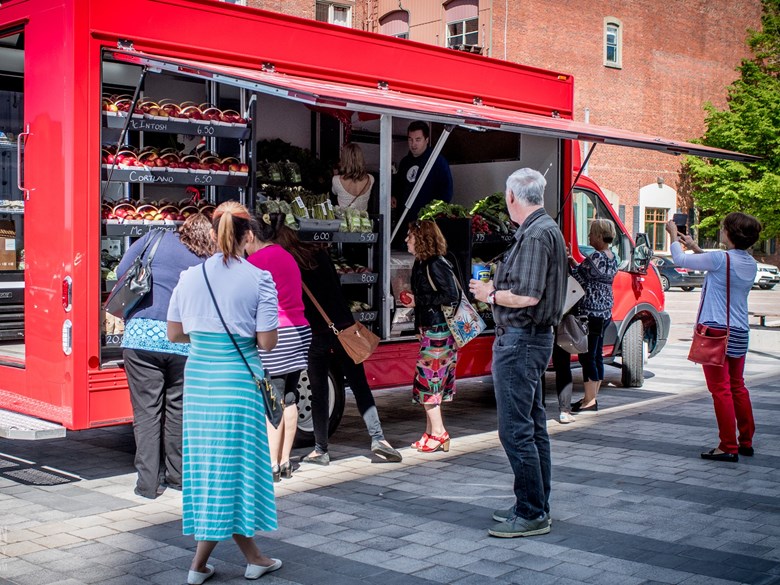
Note – In July CDFA’s Healthy Stores Refrigeration Grant Program awarded more than $2.8 million in grants to 28 small businesses, community-based organizations, and local governments to fund energy-efficient refrigeration units for areas with low access to full-service grocery stores.
By Julia Mitric
Imagine hearing that familiar summer song and looking up to see a truck rolling up your block. Kids flag it down, only to find vegetables.
A mobile farm stand truck might be less exciting to kids than an ice cream truck, but the prospect of getting one in West Sacramento has proponents of urban agriculture pretty pumped up.
Here’s how it would work. Several urban farmers in West Sacramento would sell their produce through a refrigerated truck that stops in neighborhoods where residents face barriers when it comes to affording fresh, local produce.
Several areas of West Sacramento are designated as food deserts by the USDA.
The project is Sara Bernal’s brainchild. She’s the program manager of West Sacramento Urban Farms, which is part of the Center For Land-Based Learning, a non-profit based in Winters that runs farmer training programs. Bernal oversees 10 start-up farmers working on “incubator” plots that were formerly empty lots.
Bernal noticed mobile farm stand trucks popping up in Seattle, Boston and Grand Rapids, Michigan. Many were short-lived because they weren’t financially sustainable, she said.
“All these mobile trucks are trying to target low-income communities that don’t actually have the income to pay for fresh, organic produce,” says Bernal. “And then the farmers need to cover the cost of production.”
She plans to tackle the financial piece from the outset by seeking outside support from public and private funders. CalFresh recipients will be able to use their EBT cards at the mobile farm stand and there will be market match incentives to boost their purchasing power, Bernal said.
Those financial subsidies will be necessary, especially at the beginning of the project, says Davida Douglas, operations manager with Alchemist CDC, a Sacramento non-profit that runs several programs focused on improving food access.
“Realistically, you have to look at the bigger picture and what is the social cost to our society if we have families that aren’t able to eat a healthy diet,” says Douglas. “We have medical costs for our society … reduced success for kids in school … missed days from work due to diet-related illnesses. So, you’re looking at the big picture.”
Bernal applied and won an $83,000 refrigeration grant from the California Department of Food and Agriculture to purchase the custom-designed truck, which will be built in Canada by a company that specializes in this type of vehicle.
“It has refrigeration units inside — the kind of doors you’d see at a corner store — [and] a handwashing sink, an area [to] cut samples. In front of the truck you [can] put your produce on display.”
Bernal points out that the vehicle has no generator, so there won’t be emissions while the truck is parked and doing sales, she said. Its refrigeration units work off two food-grade, commercial ice packs that can be frozen in a deep-chest home freezer, according to Frederic Laforge, who designs the trucks. The vehicle being built for West Sacramento won’t hit the streets until next summer, Bernal said.
“That will [give] us time to build some partnerships within West Sacramento to see where are the most effective places to park the truck,” Bernals says. “You know, where are families already going, so they don’t have to add an additional stop to their lives to get produce.”
That truck could pop up during pick-up time at local schools, the West Sacramento Recreation Center, community health clinics and faith-based institutions. Bernal says the project will use existing maps of West Sacramento food deserts and tap the knowledge of community health groups to pinpoint the most effective places to stop.
Supporting the project is also a way to bolster “start-up farmers that are looking to scale up their small farm businesses,” says Davida Douglas of Alchemist CDC.
“It’s these small farms that will help support the economic vitality of our region,” Douglas says “And I think that’s worth investing in — and [it’s] worth looking at that true cost when we look at is this a good program and will it be successful.”


